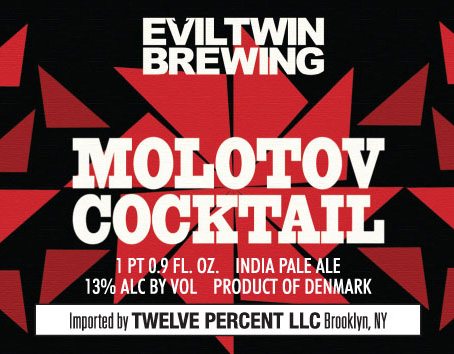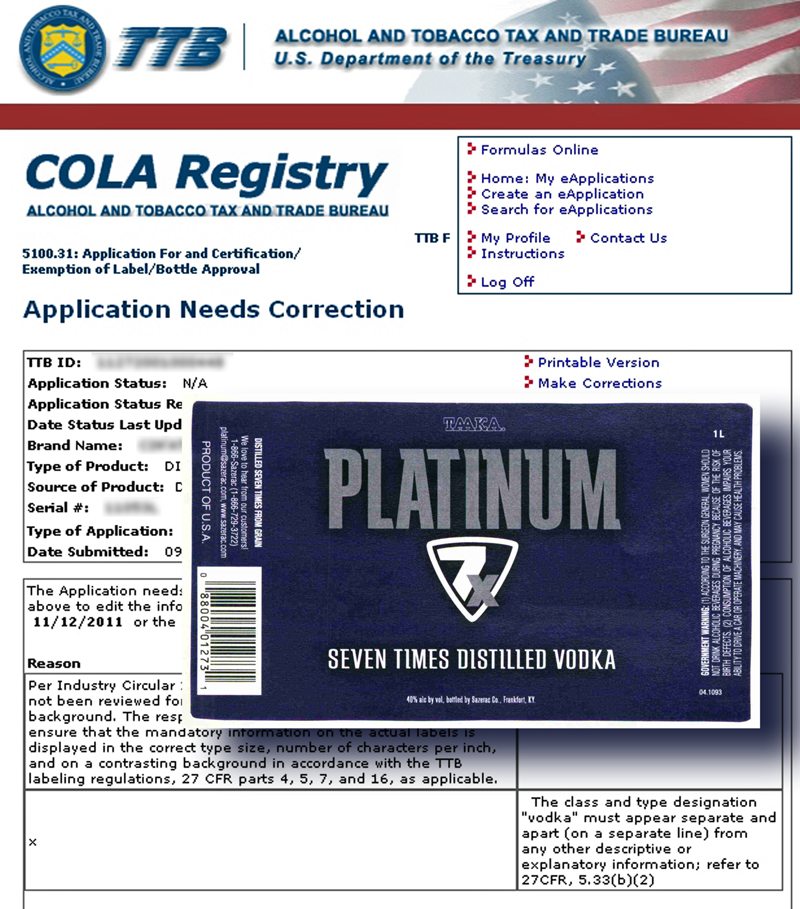I do believe this Olde Bay Saison label raises at least a few legal issues. First of all, I sure hope the brewer had permission to use this famous branding. McCormick owns the Old Bay seasoning brand and probably would not have a sense of humor about any unauthorized uses. Even if the beer is loaded up with the same seasoning, and even if the reference tends to be flattering. I can not imagine that changing one letter (from Old to Olde) is likely to help any more. The total production for this ale with spices seems to have been tiny, so that may help somewhat more to avoid problems. A second legal issue is that, such a beer needs formula approval, before label approval and production. To get formula approval, it is usually necessary to provide a detailed ingredient list to TTB. It can be very difficult for anyone to get ingredient details (beyond what FDA typically requires on a food label’s ingredient list) about famous and protected products like Coca-Cola, Angostura Bitters, or Old Bay. TTB typically needs to check for artificial flavors, allergens, colors, and use-rate limitations, and this can be very difficult to do without a complete ingredient list of the sort that McCormick would be unlikely to provide to...
Continue Reading Leave a Commentpolicy
Old Bay Beer

Tags: fda, ingredients, policy, trademarks-beverage, trademarks-food, unlikely combinations
Molotov Cocktail

Because the term “Molotov Cocktail” has been so widely used (for at least 70 years), I would have expected somebody to grab onto it and apply it to alcohol beverages sooner. It was not until July of 2011 that somebody grabbed onto it, as in the case of Evil Twin Brewing above. In this case the name relates to the “explosive” and “arrogant” amount of hops in this beer. A few years earlier, Molotov Hoptail had roughly the same idea. Hoptail gets extra points because the brewpub is just down the street and a delightful addition to the neighborhood.
I probably would have expected the term to get applied to something more akin to a traditional “cocktail” and less akin to a traditional beer. But perhaps TTB would have been concerned about the use of cocktail-type language on a spirit that is other than a “recognized cocktail.” TTB has various rules about recognized cocktails, such as pre-mixed margaritas, daiquiris and the like. For example, the BAM says a daiquiri must contain rum and lime, and a margarita must contain Tequila, triple sec and citrus. A few of these cocktails are vaguely reminiscent of the above, at least as to sound: Black Russian, White Russian, Brandy Alexander,...
Continue Reading Leave a CommentAJ Report on Health Claims, Part 2

Continued from Part 1 of 2 AJ’s next target is MGD beer. “Probably the most blatantly illegal advertisement came in early 2009, when a new beer called MGD 64 (boasting just 64 calories) sponsored an online fitness program…” With a claim like that it would be nice to know what makes it “illegal,” if not the imagery of “a thin, toned brunette in a party dress, smiling brightly as she showed off the beer-sponsored body that users could obtain if they joined.” With little analysis or evidence, AJ summarily concludes that the marketing is “patently false and misleading.” By contrast, in my opinion, if you are going to strip most of the calories and body away from a beer, down to a puny 64 calories, you darned well have the right to market it as only 64 calories (especially when the same amount of milk, apple juice or regular beer would have 2-3 times as many calories). The “Industry Watchdog” lays much of the blame for this sorry state of affairs at the feet of the industry’s failure to properly regulate itself: “Finally, the most important reason for the breakdown in regulatory oversight is the continuing charade of voluntary self-regulation.” AJ says the industry has “created a system of codes, largely designed to...
Continue Reading Leave a CommentTags: ad, policy, political, therapeutic
AJ Report on Health Claims, Part 1

Back in June, Alcohol Justice issued a report entitled “Questionable Health Claims by Alcohol Companies.” I was pretty excited to read this report, because we study such matters closely. Every few weeks I get an exuberant report of a big health claim, on another alcohol beverage product — but it almost always turns out to be a false alarm.
Also, I wanted to give AJ (formerly known as The Marin Institute) a fair chance to persuade me that a lot of companies do in fact go over “the line.” Even though I freely admit that we derive most of our revenue from alcohol beverage companies, I like to think we are fair and open-minded enough to agree with a strong and well-made point.
The report tends to say a large number of alcohol beverage companies are running roughshod over consumers, with phony health claims, and with the rules either insufficient or largely ignored. AJ suggests the rules are “constantly being violated.”
Continue Reading Leave a CommentThese advertising practices are legally tenuous, morally unsound, and potentially dangerous. … Using health messages to sell products that can cause such widespread harm is not only unethical, it’s illegal, and yet the regulatory system has failed miserably to protect the American public....
Tags: ad, policy, political, therapeutic
Peanut Butter Flavored Vodka

I am pretty sure Pyotr Smirnov never envisioned this. It is peanut butter flavored vodka. It is made by Terressentia Corporation of Charleston, South Carolina. Since I am in Charleston at this very moment, and getting hungry, this seemed like a fine time to feature this product.
Temperance has a similarly flavored product. It is surprising that TTB would allow it to be described as “Peanut Butter Vodka,” unlike the above, without the key term “Flavored” in the middle. TTB is usually more likely to allow terminology like Coconut Rum as compared to Coconut Vodka (partly on the theory that confusion could otherwise arise due to the fact that vodka could possibly be distilled from coconuts, but rum could not). No word yet on vodka distilled from peanuts.
Continue Reading Leave a CommentTags: policy, type, unlikely combinations
Class & Type Must Stand Alone

In the above example, it is not sufficient to have VODKA on the front label. Or, the right size. In addition, it needs to be “separate and apart” from other matter. TTB has gotten more strict about this over the years. The above rejection is from a few days ago. The vodka label is from many years ago, to show the movement in the policy, or the enforcement of the policy.
TTB is quite concerned about word placement and proximity. For example, “absinthe” must appear next to other words, as here. Vodka may not, as above. It is important to understand the various proximity rules, because they can lead to unpleasant surprises, and because they extend from spirits to beer and wine. It is probably not okay to bury the word “chardonnay” amidst a sentence singing its praises. It is probably not okay, in most instances, to affix several words before and after BEER.
The rule can be difficult because it’s not always clear how much separation is required (A few spaces? A few line breaks?). It’s not always clear why some terms get treated differently (such as “Silver Rum” or “Cream Liqueur”). It is easy enough to add an extra class/type statement to the front...
Continue Reading Leave a CommentTags: policy, rejections

